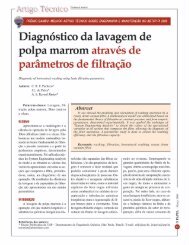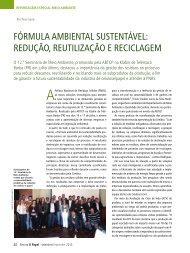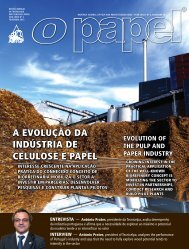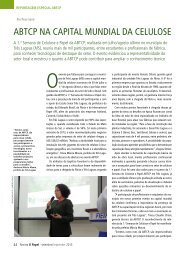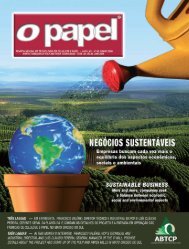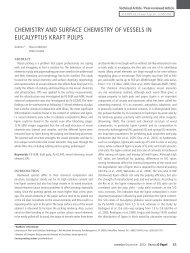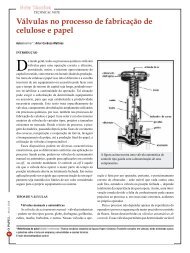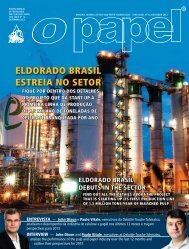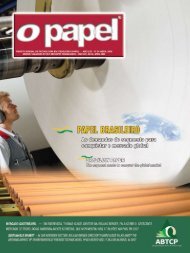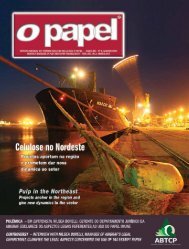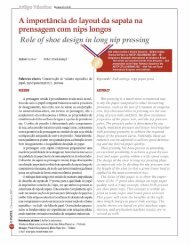Create successful ePaper yourself
Turn your PDF publications into a flip-book with our unique Google optimized e-Paper software.
Editorial<br />
sergio santorio<br />
Por Patrícia Capo,<br />
Coordenadora de Comunicação da ABTCP<br />
e Editora responsável de Publicações<br />
.: (11) 3874-2725<br />
: patriciacapo@abtcp.org.br<br />
ABTCP’s Communication Coordinator<br />
and Editor-in-chief for the Publications<br />
.: (11) 3874-2725<br />
: patriciacapo@abtcp.org.br<br />
Uma meta sustentável<br />
“A meta de estabelecer metas.” Ao ler uma das conclusões da revista Veja em<br />
reportagem sobre os resultados da Rio+20, começo a refletir se realmente os<br />
eventos dessa natureza não sejam uma meta sustentável de realizar encontros<br />
de tempos em tempos para pensar sobre o futuro do planeta, nossas atitudes<br />
e a identificação de oportunidades de construir uma economia mais humana,<br />
entre outros objetivos.<br />
Muitas expectativas giram em torno da tomada de decisões a partir desse<br />
evento, assim como ocorreu na época da Rio92. Na verdade, entretanto, os propósitos<br />
parecem, de fato, outros: reflexão, intenções e troca de pontos de vista,<br />
para que cada um saia de lá tendo sementes plantadas para rever suas posturas<br />
à frente dos negócios em suas empresas e posições de lideranças.<br />
Nossa Reportagem de Capa traz detalhes sobre o que aconteceu na Rio+20<br />
em relação aos debates sobre a indústria de base florestal. Foram dois dias de<br />
reunião entre executivos do setor, autoridades e profissionais que estiveram nos<br />
eventos organizados pela Food and Agriculture Organization (FAO) e pelo International<br />
Council of Forest and Paper Associations (ICFPA) em parceria com<br />
a Associação Brasileira de Celulose e <strong>Papel</strong> (Bracelpa) para pensar o futuro da<br />
economia verde, entre outros assuntos estratégicos.<br />
Pode ser que muitas ideias fiquem na linha das intenções, mas, mesmo assim,<br />
diretrizes deverão surgir para os negócios inovadores que, em um futuro<br />
próximo, tomarão conta da nova economia, mais humanizada, com bases nas<br />
finanças e na geração de renda, mas que também deixa a esfera do capitalismo<br />
puro e selvagem que, ao longo da história, por muitas vezes se sobrepôs a qualquer<br />
necessidade ambiental e social. O futuro parece nos remeter à integração<br />
das frentes da sustentabilidade. Quem viver verá, um dia, esses alinhamentos.<br />
A evolução da economia verde prossegue em seu ritmo, ditado pela meta<br />
sustentável de melhorar continuamente a gestão das empresas de base florestal<br />
rumo à integração entre meio ambiente, economia e sociedade, para que o<br />
equilíbrio entre esses três itens remeta a um desenvolvimento que atravesse os<br />
tempos. Nosso setor, exatamente por depender do meio ambiente para o cultivo<br />
da matéria-prima, chegará à frente das definições para estabelecer os parâmetros<br />
do cenário econômico do futuro.<br />
Além das principais conclusões sobre a Rio+20, o conteúdo editorial destaca<br />
o Plano Brasil Maior (PBM), a partir do qual setor e governo vêm traçando metas<br />
específicas para que o segmento de celulose e papel possa contribuir com o crescimento<br />
do Produto Interno Bruto (PIB) nacional. A revista O <strong>Papel</strong> entrevistou<br />
André da Hora, executivo do Banco Nacional de Desenvolvimento Econômico e<br />
Social (BNDES) que coordena o Comitê Executivo de Celulose e <strong>Papel</strong> do PBM<br />
no Banco. “As questões conjunturais do momento fazem o PBM adotar medidas<br />
de curto prazo. O que se busca, contudo, é um enfoque maior no longo prazo,<br />
de forma a solucionar gargalos que vêm acompanhando os setores industriais<br />
brasileiros durante os últimos anos”, pontua.<br />
Os colunistas Ricardo Jacomassi, de economia, e Luiz Bersou, de gestão empresarial,<br />
trazem informações importantes a respeito da previsão de preços das<br />
commodities no segundo semestre e da gestão em busca do equilíbrio, respectivamente.<br />
Completam os destaques desta edição o artigo técnico sobre refino de<br />
celulose, a reportagem sobre as mudanças na NR 13 e a matéria técnica sobre a<br />
área de normalização setorial da ABTCP em parceria com a Associação Brasileira<br />
de Normas Técnicas (ABNT).<br />
•<br />
Uma ótima leitura a todos!<br />
A sustainable target<br />
“The target of setting targets.” Reading one of the conclusions of Veja<br />
magazine report about the results of Rio+20, I began thinking whether events<br />
of such nature are not really a sustainable target for promoting meetings,<br />
from time to time, to think over the future of the planet, our attitudes and the<br />
identification of opportunities for building a more humane economy, among<br />
other objectives.<br />
Many expectations revolve around the decision-making arising from this event,<br />
just like happened at the time of Rio92. In fact, though the purposes seeming to<br />
be quite different: reflection, intentions and point of view exchanges, so that each<br />
one could leaves the meeting with planted seeds for reviewing his positions at the<br />
forefront of the businesses in his companies and leadership positions.<br />
Our Cover Story brings details on what happened at Rio+20 concerning<br />
discussions about the forest-based industry. There were two days of meetings<br />
between the executives of the sector, government officials and professionals<br />
attending the events promoted by the Food and Agriculture Organization (FAO)<br />
and by the International Council of Forest and Paper Associations (ICFPA) in<br />
partnership with the Pulp and Paper Brazilian Association (Bracelpa), in order to<br />
think of the future of the green economy, among other strategic matters.<br />
Maybe many ideas will remain as intentions only, but, even so, guidelines are<br />
to come up for the innovative businesses which, in the near future, will take on<br />
the new economy, more humane, based on finances and income generation, but<br />
leaving the world of pure and wild capitalism which, throughout history, often<br />
superposed itself to any environmental and social needs. The future seems to<br />
point us towards the integration of fronts of sustainability. Who will live will see,<br />
one day, such alignments.<br />
The evolution of the green economy proceeds at its pace, dictated by the<br />
sustainable goal of continuously improving the management of the forestbased<br />
companies towards the integration between environment, economy<br />
and society, so that the equilibrium between these three items will lead to a<br />
development persisting through the ages. Our sector, exactly because it depends<br />
on the environment for the cultivation of raw materials, will arrive ahead of the<br />
definitions aimed at outline parameters of the economic scenario of the future.<br />
Besides the main conclusions about Rio+20, the editorial highlights the Major<br />
Brazil Plan (MBP), from which industry and government are plotting specific<br />
goals so as to make the pulp and paper sector able to contribute even more to<br />
the growth of the Brazilian Gross Domestic Product (GDP). O <strong>Papel</strong> magazine<br />
interviewed André da Hora, executive of the Brazilian Development Bank<br />
(BNDES), who coordinates the Pulp and Paper Executive Committee of the MBP<br />
at the Bank. “The conjunctural issues of the moment induce the MBP to adopt<br />
short term measures. What we are pursuing, however, is a greater focus on the<br />
long term, in order to address the bottlenecks that have been accompanying the<br />
Brazilian industrial sectors in recent years” he states.<br />
The columnists Ricardo Jacomassi, writing about economy, and Luiz Bersou,<br />
writing about companies management, offer us important information about<br />
the forecast of commodities price for the second half and about management<br />
searching for equilibrium, respectively. Complement the highlights of this<br />
edition: a technical article about pulp refining, a report related to changes in the<br />
NR 13 and a technical issue referred to the ABTCP sectorial standardization area,<br />
in partnership with the Brazilian Association of Technical Standards (ABNT). •<br />
A good reading to all!<br />
8 <strong>Revista</strong> O <strong>Papel</strong> - julho/July 2012



